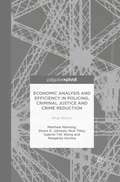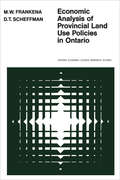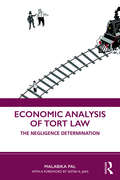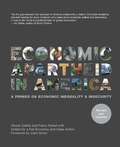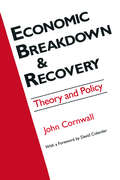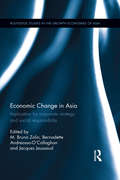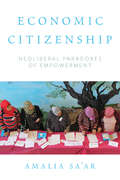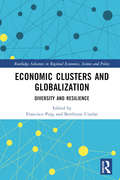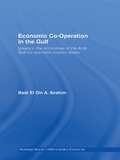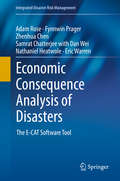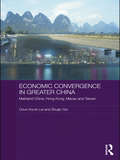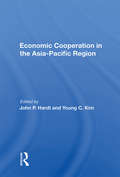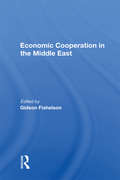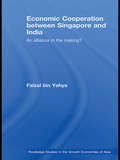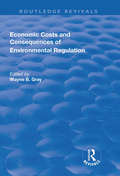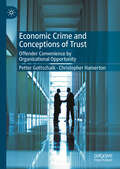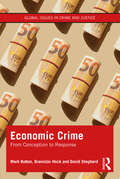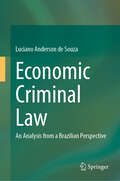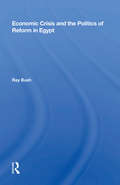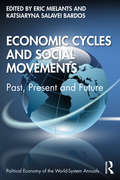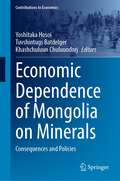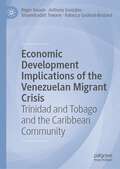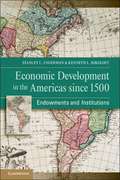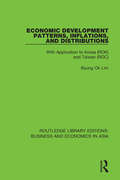- Table View
- List View
Economic Analysis and Efficiency in Policing, Criminal Justice and Crime Reduction: What Works?
by Shane D. Johnson Nick Tilley Matthew Manning Gabriel T.W. Wong Margarita VorsinaThis monograph explains what economic analysis is, why it is important, and forms it can take in policing and criminal justice. Costs are important in all forms of economic analysis but their collection tends to be partial and inadequate in capturing key information. A practical guide to the collection is therefore also provided.
Economic Analysis of Provincial Land Use Policies in Ontario
by Mark W. Frankena David T. ScheffmanThis book describes and analyses the provincial government's role in municipal and regional planning. The conversion of farmland to urban and other uses is discussed, as are the issues raised by the reports of the Ontario Planning Act Review Committee and the Federal/Provincial Task Force on the Supply and Price of Serviced Residential Land and the province's Green Paper on Planning for Agriculture. The authors criticize the government's failure to conduct cost-benefit studies before setting up planning programs and show that there is little factual basis for recent alarm over the disappearance of farmland. Data gathered here for the first time show that the conversion of agricultural land to built-up urban use and non-farm rural residential use in Ontario has been taking place quite slowly in view of the rate of productivity increase in agriculture, the stock of agricultural land, and the decline in the acreage of census farms. Economists will find in this book a useful survey of recent trends and policies. Planners, policy-makers, and students will welcome this detailed case study of how economic analysis ought to be used in formulating land use policies.
Economic Analysis of Tort Law: The Negligence Determination
by Malabika PalThis book looks at the negligence concept of tort law and studies the efficiency issue arising from the determination of negligence. It does so by scrutinizing actual court decisions from three common law jurisdictions – Britain, India and the United States of America. This volume fills a very significant gap, scrutinizing 52 landmark judgments from these three countries, by focussing on the negligent affliction of economic loss determined by common law courts and how these findings relate to the existing theoretical literature. By doing so, it examines the formalization of legal concepts in theory, primarily the question of negligence determination and liability, and their centrality in theories concerning tort law. This book will be very helpful for students, professors and practitioners of law, jurisprudence and legal theory. It will additionally be of use to researchers and academics interested in law and economics, procedure and legal history.
Economic Apartheid In America
by Chuck Collins United for a Fair Economy Felice YeskelThis updated edition of the widely touted Economic Apartheid in America looks at the causes and manifestations of wealth disparities in the United States, including tax policy in light of the 2001 and 2003 tax cuts and recent corporate scandals.Published with two leading organizations dedicated to addressing economic inequality, the book looks at recent changes in income and wealth distribution and examines the economic policies and shifts in power that have fueled the growing divide.Praised by Sojurners as "a clear blueprint on how to combat growing inequality," Economic Apartheid in America provides "much-needed groundwork for more democratic discussion and participation in economic life" (Tikkun). With "a wealth of eye-opening data" (The Beacon) focusing on the decline of organized labor and civic institutions, the battle over global trade, and the growing inequality of income and wages, it argues that most Americans are shut out of the discussion of the rules governing their economic lives. Accessible and engaging and illustrated throughout with charts, graphs, and political cartoons, the book lays out a comprehensive plan for action.
Economic Breakthrough and Recovery: Theory and Policy
by David C. Colander Jeffrey R CornwallThis study of macroeconomics combines treatment of opposing theories with a presentation of evidence to point the way toward a reconstructed macro research and policy programme.
Economic Change in Asia: Implications For Corporate Strategy and Social Responsibility (Routledge Studies in the Growth Economies of Asia)
by Jacques Jaussaud Bernadette Andreosso-O’Callaghan M. Bruna ZolinSince the 2008 global economic crisis, East Asian economies have faced a number of macroeconomic issues including China’s new growth model, the middle-income trap in developing East Asian countries, and the growing natural fibre market and its socio-economic implications. This book addresses these key topical issues which East Asian economies are facing today. Written by international experts in the area of Asian economics and business, it presents the most recent macroeconomic outlook in the region and then goes on to analyse a number of business corporations and industry-related cases, focussing on the theme of firms’ strategies. Examining the links between environmental and financial performance, corporate social responsibility and the transfer of environmental management, financial accounting standards, the relationship between corporate sustainability activities and corporate profit, and the different cultural approaches towards business ethics, this book provides both practical strategies and new theoretical insights. As such it will appeal to students, scholars and practitioners interested in Asian business and economics.
Economic Change in Asia: Implications For Corporate Strategy and Social Responsibility (Routledge Studies in the Growth Economies of Asia)
by Jacques Jaussaud Bernadette Andreosso-O’Callaghan M. Bruna ZolinSince the 2008 global economic crisis, East Asian economies have faced a number of macroeconomic issues including China’s new growth model, the middle-income trap in developing East Asian countries, and the growing natural fibre market and its socio-economic implications. This book addresses these key topical issues which East Asian economies are facing today. Written by international experts in the area of Asian economics and business, it presents the most recent macroeconomic outlook in the region and then goes on to analyse a number of business corporations and industry-related cases, focussing on the theme of firms’ strategies.Examining the links between environmental and financial performance, corporate social responsibility and the transfer of environmental management, financial accounting standards, the relationship between corporate sustainability activities and corporate profit, and the different cultural approaches towards business ethics, this book provides both practical strategies and new theoretical insights. As such it will appeal to students, scholars and practitioners interested in Asian business and economics.
Economic Citizenship: Neoliberal Paradoxes of Empowerment
by Amalia Sa'ArWith the spread of neoliberal projects, responsibility for the welfare of minority and poor citizens has shifted from states to local communities. Businesses, municipalities, grassroots activists, and state functionaries share in projects meant to help vulnerable populations become self-supportive. Ironically, such projects produce odd discursive blends of justice, solidarity, and wellbeing, and place the languages of feminist and minority rights side by side with the language of apolitical consumerism. Using theoretical concepts of economic citizenship and emotional capitalism, Economic Citizenship exposes the paradoxes that are deep within neoliberal interpretations of citizenship and analyzes the unexpected consequences of applying globally circulating notions to concrete local contexts.
Economic Clusters and Globalization: Diversity and Resilience (Routledge Advances in Regional Economics, Science and Policy)
by Francisco Puig Berrbizne UrzelaiThis volume shows that in today’s globalized world, clusters are an important factor in explaining the different growth rates of firms, cities and regions. Drawing on the expertise of an international contributor team, it covers topics such as clusters and small and medium-sized enterprise competitiveness, innovation and science parks, clusters and multinationals, and information and communication technology clusters. It reveals great diversity in terms of the origin of clusters, the organizational relationships at play, and the characteristics of the firms involved. Taking lessons from a rich variety of literature and empirical cases, the book provides valuable insights for regional development and industrial policy. Economic Clusters and Globalization will be of interest to scholars and policymakers in economic geography, regional studies, entrepreneurship and international business.
Economic Co-Operation in the Gulf: Issues in the Economies of the Arab Gulf Co-Operation Council States (Routledge Studies in Middle Eastern Economies)
by Badr El IbrahimWith global concerns over rising oil prices, this book examines the major issues facing the economies of the Arab Gulf today, covering all six of the Arab Gulf Cooperation Council (AGCC) states: Bahrain, Kuwait, Oman, Qatar, Saudi Arabia and the United Arab Emirates. Providing a detailed account of the central features of the economies of the Arab Gulf, this book draws out the critical trends that will shape the region in future years. It includes an in-depth analysis of topical issues such as the AGCC monetary union, intra-AGCC national labour movement, Islamic banking and programmes to finance small and medium-sized enterprises (SMEs). The book: assesses the costs and benefits of the proposed monetary union, assessing whether AGCC economic structures have converged sufficiently, and whether these economies have the internal flexibility necessary to make the union work effectively investigates intra-national labour mobility in the context of the forthcoming monetary union and identifies the most crucial features in a successful common AGCC employment strategy considers the fortunes of the prominent Islamic banks in the region examines the impact on liquidity of the external economic environment and regulatory policy contrasts and compares some of the major SME financing schemes, focusing in particular on SME financing in Oman.
Economic Consequence Analysis of Disasters
by Dan Wei Adam Rose Fynnwin Prager Zhenhua Chen Samrat Chatterjee Nathaniel Heatwole Eric WarrenThis study develops a methodology for rapidly obtaining approximate estimates of the economic consequences from numerous natural, man-made and technological threats. This software tool is intended for use by various decision makers and analysts to obtain estimates rapidly. It is programmed in Excel and Visual Basic for Applications (VBA) to facilitate its use. This tool is called E-CAT (Economic Consequence Analysis Tool) and accounts for the cumulative direct and indirect impacts (including resilience and behavioral factors that significantly affect base estimates) on the U. S. economy. E-CAT is intended to be a major step toward advancing the current state of economic consequence analysis (ECA) and also contributing to and developing interest in further research into complex but rapid turnaround approaches. The essence of the methodology involves running numerous simulations in a computable general equilibrium (CGE) model for each threat, yielding synthetic data for the estimation of a single regression equation based on the identification of key explanatory variables (threat characteristics and background conditions). This transforms the results of a complex model, which is beyond the reach of most users, into a "reduced form" model that is readily comprehensible. Functionality has been built into E-CAT so that its users can switch various consequence categories on and off in order to create customized profiles of economic consequences of numerous risk events. E-CAT incorporates uncertainty on both the input and output side in the course of the analysis.
Economic Convergence in Greater China: Mainland China, Hong Kong, Macau and Taiwan (Routledge Studies on the Chinese Economy)
by Shujie Yao Chun Kwok LeiAlthough China's economy has grown very rapidly in recent decades, there are still very large differences between the economy of mainland China and the economies of Hong Kong, Macau and Taiwan. For example, per capita income in Hong Kong is many, many times higher than per capita income in mainland China. This book considers the degree to which economic convergence between mainland China, Hong Kong, Macau and Taiwan has occurred, and the prospects for increased convergence in the future. It considers economic integration between China and its two Special Administrative Regions (SARS), emphasising the large volume of capital flows and exports, especially from Hong Kong into China, and showing that the economies are highly integrated, despites their differences. It examines income convergence, and changes in productivity, using the same measures for both China and the two SARS, unlike most existing studies. It explores how economic reforms have been crucial to increasing convergence so far, and will continue to be in the future, and concludes by discussing the implications for policy of encouraging increased convergence.
Economic Cooperation In The Asia-pacific Region
by John P HardtThe Asia-Pacific region has, in the eyes of most observers, the potential to become the engine of global economic growth in the 21st century. Whether it does will largely depend upon the willingness of the region's nations to pursue economic co-operation and peaceful reconciliation of differences. In this volume, scholars, policy experts, and repre
Economic Cooperation In The Middle East
by Gideon FishelsonThis book is an outcome of conference on Economic Cooperation in the Middle East held at Tel Aviv University in 1986. It examines economic integration in the Middle East, its implications and possible costs. The book analyzes the consequences of peace and economic cooperation in the Middle East.
Economic Cooperation between Singapore and India: An Alliance in the Making? (Routledge Studies In The Growth Economies Of Asia)
by Faizal bin YahyaAsian interregional economic cooperation has assumed greater prominence with the rise of Asia‘s two giant economies of China and India. The economic liberalization of China‘s economy in 1979, followed by India in 1991, signalled the presence of business opportunities to foreign investors - including those from Asia. This book examines the growing e
Economic Costs and Consequences of Environmental Regulation (Routledge Revivals)
by Wayne B. GrayThis title was first published in 2002. How expensive is environmental regulation and how does it affect the economy? A proper understanding of the costs imposed by environmental regulation is important for policy-makers and others concerned with regulatory design. This book focuses on empirical studies of the impact of environmental regulation on the economy, exposing the reader to a variety of estimation methodologies and datasets that have been used in this area. Three basic sources provide information on the costs of environmental regulation: surveys; engineering studies; and econometric analysis. This text draws on all three in its investigation.
Economic Crime and Conceptions of Trust: Offender Convenience by Organizational Opportunity
by Petter Gottschalk Christopher HamertonEconomic Crime and Conceptions of Trust explores the intricacies of the contemporary concept of trust in episodes of misconduct through an analysis of workplace deviance and crime. Grounded in detailed examinations of contemporary case studies and bolstered by original comparative fieldwork, the text takes an offender-focused approach, emphasizing the pivotal role of convenience. Adopting an interdisciplinary perspective, the authors seek to enhance and broaden existing understanding of white-collar and corporate criminology, while also highlighting its relevance to strategic management studies. A core argument of the book is that the traditional emphasis on individual actors and notions of trustworthiness when conceptualising white-collar has waned in recent times. The authors’ perspective revisits and builds upon this important foundational concept of late twentieth-century discourse within the discipline, signalling a need for a reassessment and highlighting a number of recent conceptual developments to evaluate and position trust within the twenty-first century globalized business sphere.
Economic Crime: From Conception to Response (Global Issues in Crime and Justice)
by Mark Button David Shepherd Branislav HockThis book is the first attempt to establish 'economic crime' as a new sub-discipline within criminology. Fraud, corruption, bribery, money laundering, price-fixing cartels and intellectual property crimes pursued typically for financial and professional gain, have devastating consequences for the prosperity of economic life. While most police forces in the UK and the USA have an ‘economic crime’ department, and many European bodies such as Europol use the term and develop strategies and structures to deal with it, it is yet to grain traction as a widely used term in the academic community. Economic Crime: From Conception to Response aims to change that and covers: definitions of the key premises of economic crime as the academic sub-discipline within criminology; an overview of the key research on each of the crimes associated with economic crime; public, private and global responses to economic crime across its different forms and sectors of the economy, both within the UK and globally. This book is an essential resource for students, academics and practitioners engaged with aspects of economic crime, as well as the related areas of financial crime, white-collar crime and crimes of the powerful.
Economic Criminal Law: An Analysis from a Brazilian Perspective
by Luciano Anderson SouzaThis book investigates the legitimacy of Economic Criminal Law. Initially, it examines the history of the intersection between criminal law and economy, aiming at finding a possible evolutionary trait. Then it defines what is meant by Economic Criminal Law, and whether it would be necessary and possible to subsume it to the protected interest theory. Subsequently it analyzes theories that intend to equate the administratisation of criminal law, highlighting the proposed administrative-punitive. Finally, the conclusion searches for the best legal construction of the rules for economic infractions, limiting the role of criminal law in this context. The imperiousness of effective protection of the economic environment seems undeniable today. The structure of post-industrial capitalist system reveals, paradoxically, features unwanted by the existing mode of production, which the contemporary sociology understands as the reflexivity of risk society. In this sense, the economic agents undertake conduct detrimental to the conformation of the economic society, undermining the smooth functioning of the economy itself. In this context, the law, especially the criminal law, is used to try to head them off. It happens that such employment of legal and judicial branch clashes with their traditional boundaries, delineated since the Enlightenment. Complex economic behavior are criminally prohibited, in most cases through typifying proactive formulations, which are inconsistent and display as mere means of behavioral conformation, subject to administrative jurisdiction, which leads to the administrativization of the criminal law.
Economic Crisis And The Politics Of Reform In Egypt
by Ray BushThis book examines the character and consequences of Egypt's economic reform and structural adjustment programme of 1991, along with the second stage of reforms in 1996. It contributes to the debates underpinning the political economy of economic reform and agricultural reform.
Economic Cycles and Social Movements: Past, Present and Future (Political Economy of the World-System Annuals)
by Eric Mielants Katsiaryna Salavei BardosEconomic Cycles and Social Movements: Past, Present and Future offers diverse perspectives on the complex interrelationship between social challenges and economic crises in the Modern World System. Written with a balance of quantitative, qualitative and theoretical contributions and insights, this volume provides a great opportunity to reflect upon the ongoing conceptual and empirical challenges when confronting the complex interrelations of various economic cycles and social movements. By engaging wide-ranging ideas and theoretical points of view from different disciplines, different countries and different perspectives, this study breaks new ground and offers novel insights into the way the capitalist world economy functions as well as the way social and political movements react to these constraints. Different chapters in this volume bring about novel interdisciplinary approaches to study business cycles, economic changes and social as well as political movements, offer new interpretations and, while examining the complexity of socioeconomic cycles in the long run, present epistemological challenges and a wide variety of empirical data that will increase our understanding of these complex interactions.
Economic Dependence of Mongolia on Minerals: Consequences and Policies (Contributions to Economics)
by Yoshitaka Hosoi Tuvshintugs Batdelger Khashchuluun ChuluundorjThis book is a compass for resource rich-developing countries, taking Mongolia as a case study. Policy aspects of the development of the mining sector in developing countries such as Mongolia and its impact on the economy and society are reviewed. The book deals with specific industry policies and challenges identified by policy makers, its characteristics and policy recommendations moving forward with an emphasis on the importance of evidence-based policy making (EBPM). It begins with the country’s development strategy and the role of the mining industry, highlighting the fact that major strategic and policy documents still suffer from ambiguity and clear guidance as well as gaps in policy directions. The book also highlights the need for policy makers to improve transparency initiatives. Authors emphasize transparency or lack thereof in mining contracts, taxation, trading, and marketing and provide specific policy recommendations and alternative policy actions. The macroeconomic and social impact of the mining sector and the role of foreign direct investment is also discussed. Particularly, utilizing in-house economic analytical tools, the role and impact of resource revenue management policy in Mongolia is evaluated. Further, the impact of mining projects on the livelihood of local households as well as the importance of obtaining a social license to operate is discussed. This monograph is recommended for readers who want an in-depth comprehensive understanding of the mining sector, EBPM, and key lessons learned in managing natural resources in Mongolia.
Economic Development Implications of the Venezuelan Migrant Crisis: Trinidad and Tobago and the Caribbean Community
by Bhoendradatt Tewarie Roger Hosein Anthony Gonzales Rebecca Gookool-BoslandThis book analyzes the ways in which the Venezuelan immigrant community is making an impact on the social and economic dynamic of small economies. This publication addresses some of the main economic development conversations on trade, labor, and fiscal implications of immigration. This book attempts to collate and unpack some of the relevant theoretical frameworks which provide a basis for policymakers and other key decision-makers. In this regard, the links between immigration and economic development is discussed with a focus on Trinidad and Tobago as a representative case within the Caribbean community.
Economic Development In The Americas Since 1500: Endowments And Institutions
by Kenneth L. Sokoloff Stanley L. Engerman Stephen Haber Elisa V. Mariscal Eric M. ZoltThis book brings together a number of previously published articles by Stanley L. Engerman and Kenneth L. Sokoloff. Its essays deal with differences in the rates of economic growth in Latin American and mainland North America, specifically the United States and Canada. It demonstrates how relative differences in growth over time are related to differences in the institutions that developed in different economies. This variation is driven by differences in major institutions - suffrage, education, tax policy, land and immigration policy, and banking and financial organizations. These factors, in turn, are all related to differences in endowments, climate, and natural resources. Providing a comprehensive treatment of its topic, the essays have been revised to reflect new developments and research.
Economic Development Patterns, Inflations, and Distributions: With Application to Korea (ROK) and Taiwan (ROC) (Routledge Library Editions: Business and Economics in Asia #10)
by Byung Ok LimThe focal point of this study, first published in 1991, is to investigate the effect of growth patterns on inflation and the distribution of income through inductive examination of the particular experiences in Korea and Taiwan. Both countries are regarded as models of successful industrialization, but contrast significantly in the matter of their development strategy yielding a more equitable distribution of income, along with a moderate inflation from the benefits of economic growth. Korea experienced considerable rates of inflation and a worsening of the distribution of income, while Taiwan avoided both economic evils. This book analyses how Taiwan’s economy managed to reconcile growth with inflation and distribution and why Korea could not achieve similar performance.
